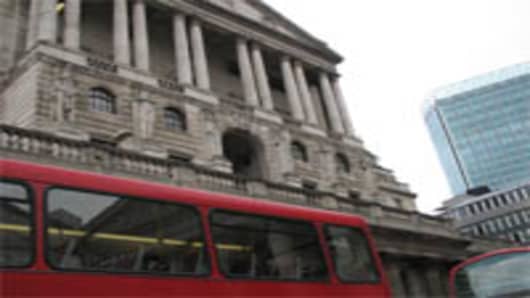The Bank of England (BoE) considered a further round of quantitative easing to help boost the flagging UK economy, the latest minutes of its interest rate setting committee, the Monetary Policy Committee (MPC) showed on Wednesday.
The minutes of the meeting held on September 7 and 8 showed that only one member, Adam Posen, voted for the Bank to take action immediately. But the minutes also revealed that most members now feel that an additional round of monetary easingof around 50 billion pounds ($78 billion) will be necessary in the coming months.
Posen has consistently called for further action by the Bankfor the past year, while he has usually been opposed by external MPC member Martin Weale and deputy governor Charles Bean, both of whom have acknowledged the worsening economy situation in the UK and dropped calls for interest rates to be raised.
"For most members, the decision of whether to embark on further monetary easing at this meeting was finely balanced since the weakness and stresses of the past month had significantly strengthened the case for an immediate resumption of asset purchases," the minutes said.
"For some members, a continuation of the conditions seen over the past month would probably be sufficient to justify an expansion of the asset purchase programme at a subsequent meeting."
The minutes noted a range of issues including the continuing sovereign debt crisis in Europe, the worsening economic situation in the United States, and weaker export markets. It also pointed to a series of economic reports that showed global economic growth as well as UK economic growth coming in well below expectations. In August the Bank lowered its own economic growth forecast for the UK by 0.4 percent.
As if to add to the gloom the International Monetary Fund (IMF) warned countries around the world on Tuesday they needed a plan B to deal with the worsening global economic outlook for this year and 2012. The IMF warned Britain specifically that fiscal austerity alone would not be enough to avoid the UK economy falling back into recession as it cut its growth forecast for the UK from 1.7 percent to 1.1 percent for 2011.
Separately, the Office for National Statistics said on Wednesday that UK government net borrowing excluding financial interventions rose to 15.934 billion pounds in August from 14.003 billion pounds a year ago, above analysts' forecasts for a reading of 13.2 billion pounds and a record high for the month.
Including financial interventions, public sector net borrowing also rose last month to 13.161 billion pounds from 11.852 billion pounds in August 2010, above economists' average forecast in a Reuters poll of 11.25 billion pounds.
However, public borrowing excluding financial interventions in the 2010/11 fiscal year was also revised down to 136.7 billion pounds, mainly due to revisions to local government data, the ONS said.
In an interview last Friday ahead of the Liberal Democrat annual party conference Business Secretary Vince Cable urged the BOE to take action immediately to curtail sliding growth.
"The danger of not acting is that you get a vicious downward spiral," he said.
The BOE minutes appeared to show that many members of the MPC now agree with Cable.
“This is clearly a major swing in a dovish direction and follows the BoE’s Quarterly Bulletin on Monday, which suggested that the 200 billion pounds of asset purchases the BoE made was equivalent to around 150-300bp of interest rate cuts,” James Knightley, senior economist at ING Financial Markets, said in a research note.
“This is a significant stimulus so should the BoE cut its growth and inflation forecasts, as pretty much everyone else has (the IMF included), then a November 10 increase in asset purchases will look likely. Consequently sterling will stay under downward pressure, particularly with the Federal Reserve likely to lag behind in offering and further QE.”
However, Jeremy Batstone-Carr, director of private client research at Charles Stanley, told CNBC.com that further QE in November would be unlikely to have much, if any, real impact on the economy.
“Whether it is November or not will depend on how the financial markets perform between now and then. We managed to get through yesterday but the concerns the market have is that central bank policy has been shown to be ineffective,” he said.
Batstone-Carr added that investors were now ahead of analysts in predicting the outcomes of certain economic events, such as further QE.
“Today will be interesting because the US Fed will announce Operation Twist, but the markets have already priced that in. The markets have been expecting this - which is effectively QE3 -for some time and to some extent there is an expectation of QE4, because the central banks need to do whatever they can to improve the economic situation. The problem is they don’t have that many tools and to some extent central bank policy is becoming immaterial because the markets don’t believe it can work,” he added.


